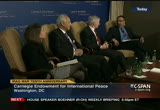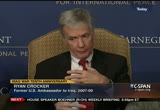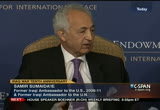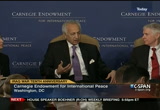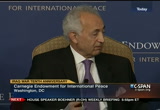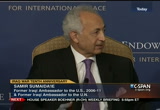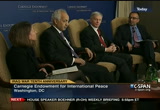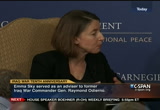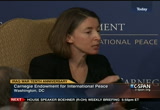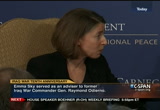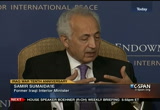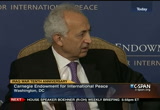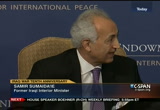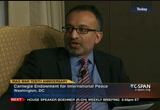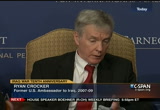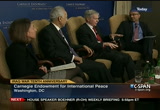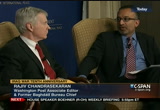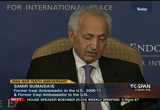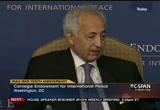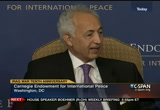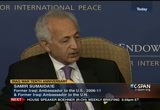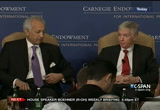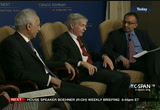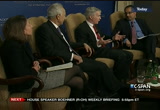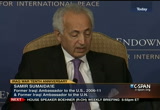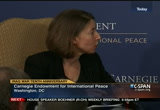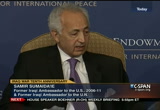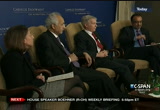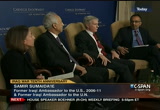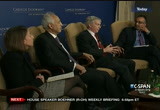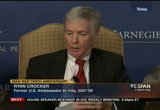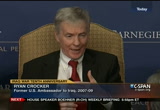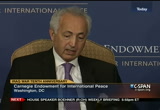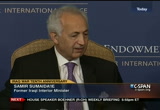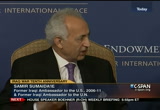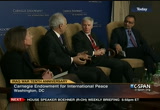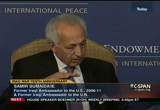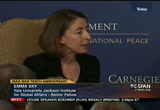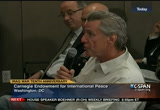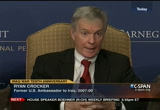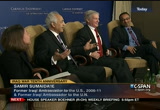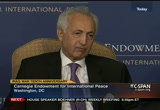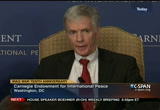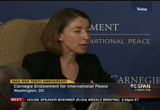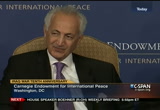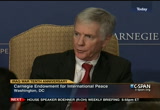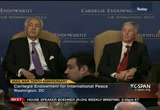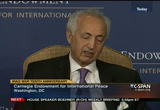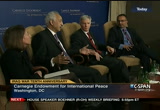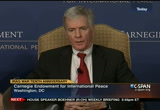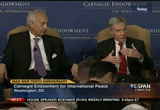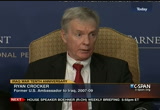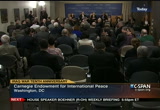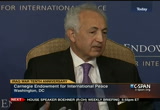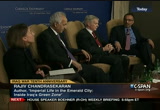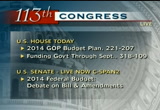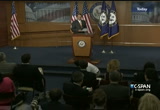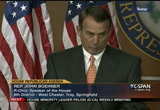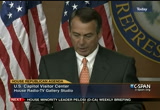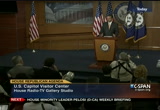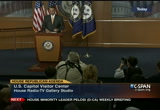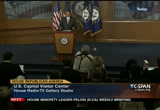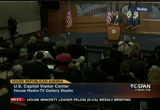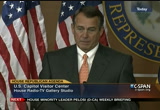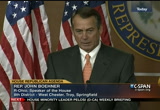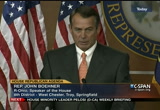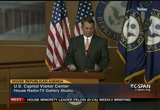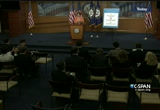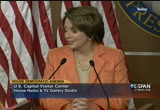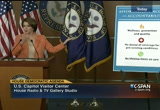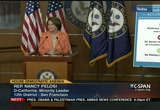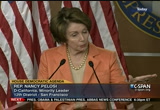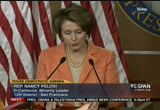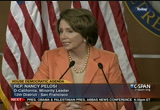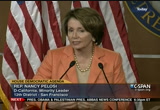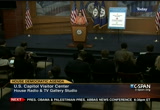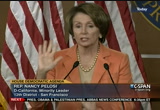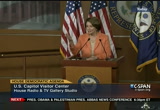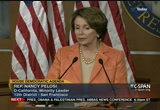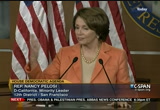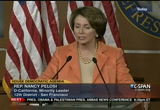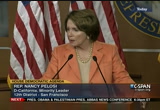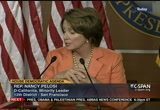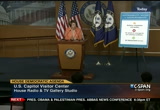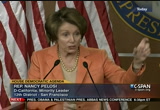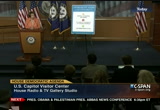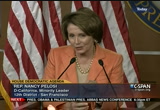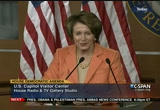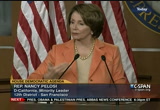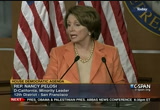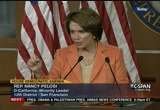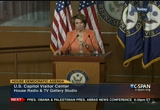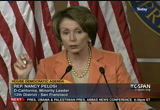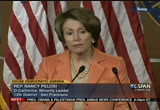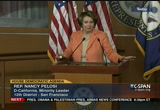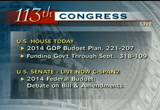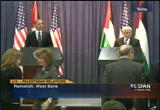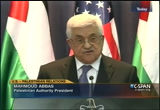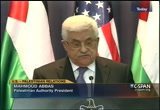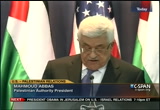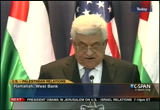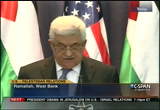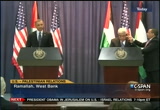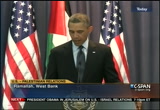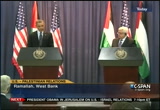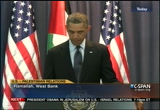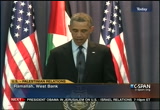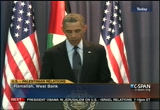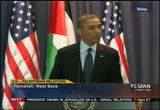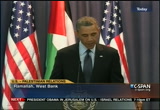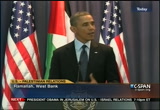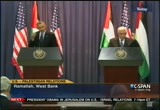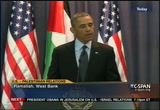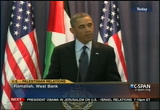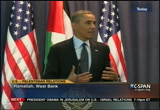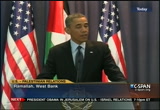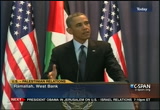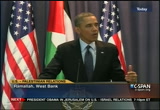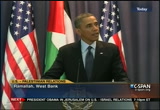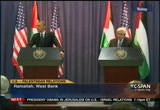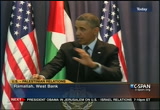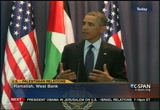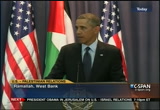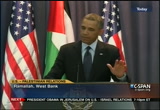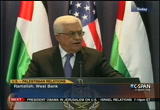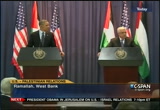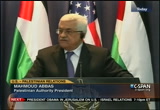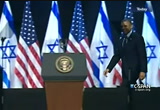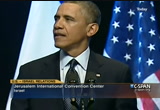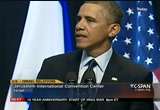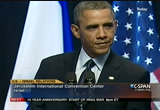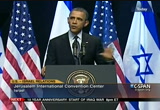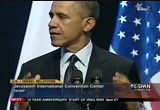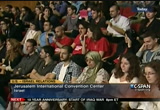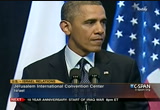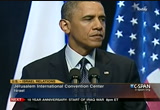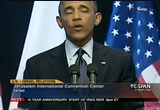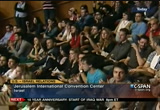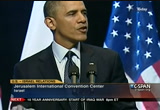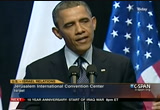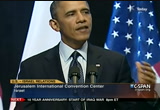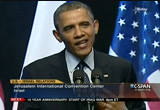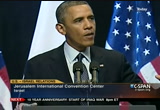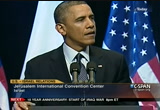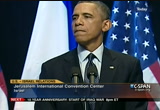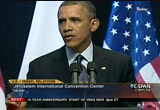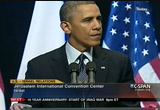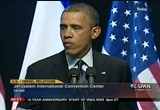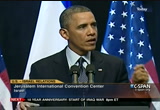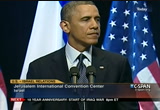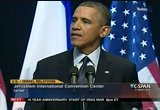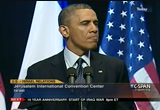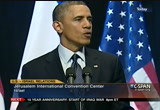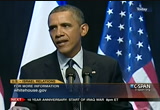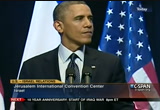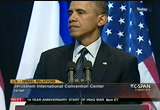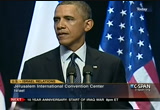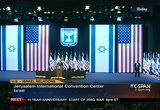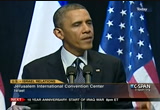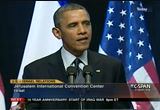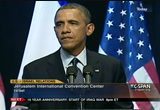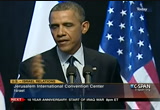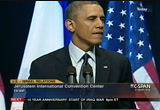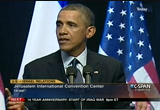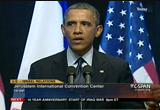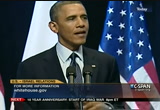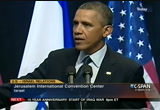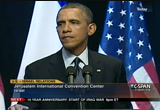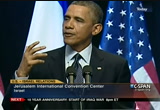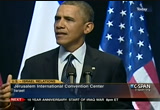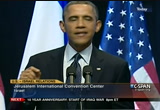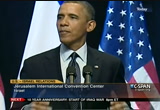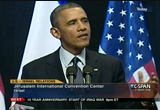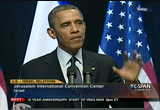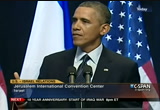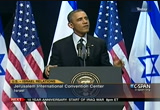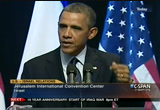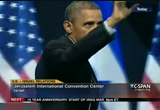tv Public Affairs CSPAN March 21, 2013 5:00pm-8:00pm EDT
5:00 pm
-- we turned so much of our attention to iraq, and with the administration's gregg focus in afghanistan, as well as a broader set of issues, it has come at a cost in dealing with it around. >> as has been said said in the past, we are a great power and we can actually do more than one thing at one time. i think there may be a band with an attentionat is issue rather than a capacity issue. again, we're not talking about deployment divisions. iraq seriously as our agreement says it should be taken and having the level of senior engagement that we should
5:01 pm
have in baghdad. i hope we will see that because it has been somewhat absent in recent years. >> how do the people of iraq view the relationship with the united states? an individual, you might get two different answers, so you can imagine if you ask that all of the people. they are conflicted about their attitude towards the united states. right from the beginning, some saw intervention by the united states as a threat and some saw it as salvation. those who saw it as salvation later found that they were disappointed in many respects. there were ships, even in the perspective of individual attitudes. shifts, even in the
5:02 pm
perspective of individual attitudes. there was great elation the set on hussein was removed, for sure. great elation that said obama hussain was removed, for sure. ddamthis was -- that said do hussein was removed, for sure. at the government level, the strategic agreement is still in place, but it would not be wrong to say that the government of see at the moment does not
5:03 pm
the american presence or influence as an integral part of its political calculation. it was a few years ago when political decisions were taken. they always factored in what the americans fought and that was certainly true. you probably remember when your the ambassador to baghdad. i do not think that is the situation now. i would even ventured to say that there is more wait for what the iranian regime things about political decisions in iraq, whether it is forming a cabinet any other major political decision. thathat does not mean
5:04 pm
americans have lost all possible influence. i think americans still have a considerable amount of soft power. i think they should use it not only with the government, and they are actually using it, to be fair, in support of civil society. i think in supporting the segment of population who are secular in their outlook, who believe that the separation of religion from the state is the salvation of the country, that is the natural ally of the united states, not the islamic side. i think there should be more support for the politics of secularism in iraq. it would not be wrong. say and bewould
5:05 pm
necessary and highly desirable for the americans to support their natural allies, which i happen to believe represent the future of iraq and i myself am part of, at a personal level. , andhere is this conflict ons conflict is not resolved the boards. the outcome of this will depend on how much the united states is willing to put into the right factors to get iraq moving in the right direction. if they fail, it will be very unfortunate, but the people who will pay the price will be the people of iraq and american interests in the region. >> very quickly, the european perspective on the u.s.-iraq relationship. >> i think many people looking
5:06 pm
at that relationship feel that the u.s. wants to forget about iraq, start looking at it through the rearview mirror, look beyond. and people find that quite difficult to understand, after all that investment. huge investments in blood and treasure over the years. when you look at the time of the surge, the u.s. reputation was way high and the iranian influence way low, and now the balance has completely changed. people think the u.s. has much more influence and is not wielding the influence it could have. does the u.s.y not do more to contain some of maliki's worst instincts? why why do they not do a better job balancing the different communities within iraq? and you can ask a follow-up question.
5:07 pm
>> how should the united states be doing that, and then i would love to hear from the others. how do you all believe the united states should be read calibrating its relationship -- relationship, its and to build on the point, if the natural allies of the united states are those that believe in more secular government, how do a zero sum nature of iraqi politics without further worsening relationship with maliki? people believe the u.s. debt on maliki in 2010. rather than -- bet on maliki in 2010.
5:08 pm
rather than long-term investments, it was seen as maliki is the guy. but the long term interest is for iraq to be more democratic. it is never going to be a liberal democracy in the gulf. but as the ambassador said, it is a strategic framework agreement which provides the framework to do that, to invest in institutions, to build a better relations with iraq's people. huge influencehe that the u.s. exerts with neighboring countries. baghdad needs the u.s. to use that influence to help iraq, to help baghdad, to help malick he himself have better relationships. and of course, there are the arms sales. will the u.s. continued to just sell arms, sell arms with no
5:09 pm
conditions placed on it? tothose arms are used oppress mr. maliki's domestic rivals? u.s.w else should the recovery that relationship? think it is possible to have a two-pronged relationship, even with the government. we will support you, but we will not support aggressive action. we will support you, but we will accept human rights violations. we will support the political process and the political system as long as it actively serves the principles on which it was felt. -- built. now let me make a very important
5:10 pm
point of this juncture. at the beginning, when we were traditional -- transitional administrative law and later on when the peace was negotiated, there was an assumption that the players were going to abide by the rules. this assumption was wrong. some had no intention of abiding. they went along, but as soon as they got into power, they started flouting the rules, blatantly. , it is stateditly in the constitution of certain institutions are independent, like the central bank. the law made clear that it was
5:11 pm
independent of the government. was the head of the media committee, and restructured a media commission that was intended to be independent. all of these have been reined in and the auspices and the control of the prime minister have done it on the basis of, well, these all have some executive functions and therefore they should be part of it. they are abusing the semantic definition. that really means a kind of of allng of the power these institutions, which are the guardians of the democratic system. , what do weave gone
5:12 pm
have for this democracy? the americans should make it clear where they stand on these issues. iraqeneral perception in is that, well, maliki is in power because both the iranians and the americans want him to be there. that should be dispelled. it should be clear that the americans are committed to the political system in iraq, not one individual, not one government. governments come and go, but they must be built on a foundation in order to be sustainable, in order to create the stability and therefore the prosperity that will flow out of iraq. >> what is the clearest way to do that? i mean, we talked a little bit about tariffs. is it time to reevaluate arms sales at this point? >> i think it is time to engage
5:13 pm
in a serious, sustained and high-level manner. and through that engagement, exert greater influence, frankly, with all the parties. i think they could all use it. and to use as your structure for that the framework agreement, because it is about institutions, their strengthening and their endurance, as well as it is about cooperation in a variety of fields that are of benefit to iraq as well as the united states. we have a very able ambassador in baghdad right now, but the nature of the relationship, the recollection of the iraqis over how it used to be, with routine high-level engagement, i think suggests strongly that to get at
5:14 pm
just the point that have been raised, we have got to of our game here. our game here. i would very much like to see the secretary of state make a visit to iraq. in the previous ed ministration, for a variety of reasons -- previous administration, for a variety of reasons, the secretary did not visit. secretaries of defense routinely visit countries where we do not have troops deployed, but it would get everybody guessing, wouldn't it? in a similar vein, i would like to see the chairman of the joint chiefs of staff visit. these kind of visits provide a framework to get at questions like balances, institutions vs individuals, arms sales and their conditions and some useful words of advice, both to those
5:15 pm
in the ascendancy and to those in the opposition, because as i said, i think all parties need it. one individual who has not yet come of it is muqtada all solder. i am keen to hear your thoughts -- muqtada al-sadr. i am keen to hear your thoughts on him playing a constructive role as a shia nationalist figure and potentially seeking to break further from the broader shia coalition and ally unnis andent with sienese kurds, playing the role of a
5:16 pm
spoiler. would that be a positive development, in any of your fors, or a prescription even more trouble ahead? >> muqtada al-sadr has been a rather unpredictable player on qi stage.a he came in on a wave of love and admiration because his father was murdered by saddam hussein'. his father was a singer, a writer and a clergyman, a viewed witherson great respect.
5:17 pm
were those who venerated him. and this was his son. so, he was swept into this position of power, for which he had no qualifications whatsoever. candidate he was a for manipulation by people who had much more experience, including our iranian neighbors. his recent actions -- although i think his instincts were, as you pointed out, much i,re nationalist, iraq's helping the board, but his political motivations were all over the map. what he will do the next day, the next month, if you ask them, i think he will get -- again,
5:18 pm
and answered today and a different answer tomorrow. it is difficult for me to sit here and say how he is going to act, but he is a factor and he will continue to be a factor. the next elections next year are going to show, hopefully, the more mature response from the electorate. addng said that, i quickly the qualification of this will be, again, colored and tempered by the fears of being whipped up right now. , therehe islamist shia is a weapon they use, the sun nis are coming to get you. and that is now amplified by the sunnis arabs are coming to
5:19 pm
get you. that makes the fear even more potent. things that the sunni arabs in iraq should do is try to alleviate this year. ist of the wider element aware of the danger of this yeafear, of government out of control. muqtada,ack to my d the next elections, if they are not colored by a fervor, might produce a more mature out, and provide a new crop of younger
5:20 pm
leaders who have been less contaminated by the events of recent years. there is a ray of hope there. >> if i could just add to that, theree entirely with ambassador's assessment of muqtada al-sadr. he himself does not know what he the day after tomorrow. sadly, assassination can be very effective and the assassination of his father and two brothers has had a lasting effect on has anothercs, as assassination. family, that once
5:21 pm
stood not only for a moderate form of shia some but for iraqi and arab nationalism, we are now down to be shallow end of the sadr gene pool. [laughter] in 2008 wheneriod the hope was, which yo articulated, that dsadr, to -- that out would make reach over the sectarian divide to the sudnnis. it never really happened, to the immense relief of the kurds, and therein lies the complexity of all of this. you can manage to make perhaps
5:22 pm
two out of three reasonably content, that getting three out of three has deluded us and the andis for the last decade, iraq for the last century. there is a point of light to come back to with respect to the u.s. only do i believe we need to be more effectively and , iisively engaged with iraq - believe we need to be more effectively and decisively engaged with the region on behalf of iraq. made what i thought was a pretty persuasive talking point that if you are concerned about iranian influence in iraq, why don't you reopen your embassies, how foreign minister's visit, iraqis to your capital
5:23 pm
and pushed back on persian influence with arab influence? it persuaded the, but persuaded no one else. throughegion changes the arab spring, i think this is again a time for more active u.s. diplomacy in the region on behalf of iraq. >> i like to add a follow-up comment here. i agree entirely on this. muqtada should not always be viewed as a free agent. recent episode when there was an attempt to unseat maliki in parliament by a vote of no- confidence, initially muqtada action andn this
5:24 pm
this plan, but later withdrew. the affirmation i have is that he withdrew because so few of his lieutenants -- because a few himis lieutenants came to and told him they could not protect him if he went through with this plan. i don't know, but it is the least -- it at least explain some of the capricious nature of his decisions. andakes a decision today then he changes it tomorrow to another thing. >> can i just make one final comment about muqtada? he is hard to read, but in the last few months, there has been a maturing in his behavior. mores chosen not to be sectarian. he has chosen to reach out to the kurds and reach out to be sunnis.
5:25 pm
you have seen him going to 1 lebanon. you have seen a change in his behavior, and he could have acted differently, so he deserves some credit for that. >> his instincts are right because he was brought up in that family. and this family is rooted in iraqi culture and history and is others,like some of the as being very iraqi and very arab, and for that reason, is loved by sunnis and shia alike. of referred to iran in a negative sense throughout, for iraq toportant
5:26 pm
have a working relationship with iran. we have historical, cultural, family ties with iranian society and we have religious ties. and we have every year hundreds of thousands, if not millions of pilgrims who come from iran to visit the holy shrines in iraq. so, a healthy and positive relationship between the two countries is absolutely essentials. it has got to be done in such a way that it is free of domination, that it is based on mutual respect and independence. in the current situation, that is a little difficult, but that is what we should be aiming toward. >> that is where the u.s. comes in again. one last question and then i will turn it over to all of you. i think it would be a safe assumption that the three of you
5:27 pm
would be in favor of a more secular arab iraqi gun -- secular iraqi government in the future. the results of the last election are not lost on all of us, but ofone looks for that as sort an aspiration, is the better approach one that actually seeks to build institutions and promote the motion of -- notion of a more secular form of government and essentially seeks to empower and this is leaders withmore -- assist leaders more secular tendencies, or is the reality that we are going to be facing, for the foreseeable future, sectarian and ethnically divided politics, and that they have to some sort of greater
5:28 pm
political stability has to -- a path to some sort of greater political stability has to involve a degree of negotiated political compromise within the factions and saying look, the idea that you are going to get enough individuals from the principal constituencies into some sort of big tent is unrealistic, and really, it has got to be more progress on the sharing and distribution of oil revenue, a more equitable distribution of political power, and recognizing that we are in this religiously and fractured society, and it is a challenge of seeking to build the appropriate compromise? >> if i could start. i think it is a bit of both. first, recognizing reality for what it is in iraq today.
5:29 pm
we have had our utopian vision for iraq. it has not worked out well, not for iraqis and not for ourselves. first, we need to recognize reality and then see how we can work with that reality to build a better future for iraqis. i do not think the united states should be in the position in iraq or elsewhere of taking a position in principle that we oppose religiously based parties by definition and will only favor secular parties. i think that is highly dangerous. inherent in ang religious party, whether it be iraqi shia side or the sideic party on the sunni
5:30 pm
that is contrary to a national vision for iraq. it is the way events and personalities -- and i think the emphasis on we have got to be careful how we approach that. not only because i negotiated it, the strategic framework agreement gives us that vehicle to move forward. set aside the identity of parties and focus on the development of institutions, the development of a pluralistic approach, the knowledge that iraq ultimately succeeds as a whole or will fail in its parts and move on from there, but that requires a level of senior u.s. engagement that we have not seen and badly need. >> ambassador? >> for the first time i have to disagree with ambassador crocker.
5:31 pm
>> thank god. ideologically, religious parties are by nature sectarian, and sectarian politics is divisive, and they are incompatible with a national vision, in my view. this has been proven in practice. people who see themselves as champions of this sect or that see themselves or be champions of the whole nation. have twoountry, you one major parties, protestant, and one catholic, and you see what happens of that. in iraq, we have paid the price and had paid the price of
5:32 pm
the american view of how workable this is, because it is not. back to a couple of squares. now of the people who are leaders in iraq were born and regime,during somaddam's which lasted for about 35 years. people were conditioned by the andthe government was run, by this highly entrenched and of effective system of money the goodies -- le who moneyfitful,
5:33 pm
it is a system of patronage this generation. you take this generation and say, now we are born to play under different rules, where drug that parliament, the judiciary will be independent, and you got to play like this. fine, that sounds good. when they are actually playing, they are automatically drawn to under. they were born this is what happened, particularly this summer -- particularly because some of them came with a sense of grievance, and now it is their chance. to conciliatem do his power? he seized power.
5:34 pm
it worked for him. and the newcomers, exactly the same. er interior,nist defense, and the effective minister of intelligence. hardly anything goes by the security front that does not go past his circle, and oil and revenue from oil is effectively run by him. i remember the discussions in the governing council. there was a huge pressure from the parties come from the islamist parties in particular, to appoint as many of their followers as possible, not only to positions of responsibility and leadership, but also to kill the request to fill the ranks of
5:35 pm
the security and other government. i'm sorry if i take one more minute on the street and assess one moreke mor minute. now it is nearly 100,000. most of these appointees are from political parties. you want the job? go to the police. it is now a system of patronage, which was exactly the same structure. when you look at the superimposed, superficially superimposed structure of political relationships, which we now called democracy. beyond,erneath, look and you will see the reality that really to a larger extent than you expect resembles the
5:36 pm
ugly face of the saddam regime. voting forre parties that were not running on sectarian platforms, and you saw the iraqi people wanting to find themselves that way. unfortunately, the opportunity that the u.s. had to negotiate a new political dispensation to break the sectarian constructs, to get a new agreement, was missed. and the same dysfunctional system is in place. what i fear coming into the national elections, scheduled for 2014, is that you probably will end up with maliki as the largest coalition, but is unlikely to get enough votes to get the support of the
5:37 pm
parliament. there is likely to be no consensus candidate in opposition so you have and acting prime minister with everybody else acting because filled withis now the same elites. >> great opportunities as well as challenges. >> time for a few questions. do we have a microphone? hold on one second. thank you. in the white shirt. if iran does get the bomb, which i believe it will despite of the sanctions regime, what will be the impact on sectarian politics in iraq and regionally in general? >> thank you. >> it was a question that came up during the time i was willsador, and samir
5:38 pm
obviously have views of his own. i did not find that iraqis worry too much about the bombing in iran. remember the prime minister once shrugged and said they are not going to drop it on us. it will blow back on them. farther afield, it is somebody else's problem. if you share the analysis that one of the consequences of iran getting the bomb would the a new round of proliferation at the saudis -- proliferation, saudis would not accept that, but they could pick at the bomb, and they certainly could buy it, then you got a new element of instability in the region.
5:39 pm
but one in which certain elements of the population in iraq might not be adverse to. >> iraqis did not lose much sleep over this issue, actually. here.e with ryan this is not an issue for iraqis. we obviously do not like the idea that iran has a nuclear bomb, or any neighbor having a nuclear bomb, and that the general feeling in iraq, we would rather have a nuclear-free middle east. we have managed to rid ourselves of any weapons of mass destruction -- [laughter] committed by its constitution to be free of such weapons, and we would rather be living in a neighborhood which is free of these.
5:40 pm
if presidential elections are postponed in anbar, what message will that center, ambassador? the does postponing election does to the morale of iraqi voters, and is as a foreshadowing of how the national elections go, and did you think increased diplomatic engagement could change the outcome of that decision , thatms. sky, how does the rest of the world see us come is somehow that the u.s. is failing in the process, where does anybody care? >> that sends a negative message if elections are postponed and two provinces. the question is then, will there be elections soon or never?
5:41 pm
i do not want to make more than my fair share of time, but just government current tried to prepare for the next election, this comes back to the system of patronage. it is well rooted in baghdad and the southern areas, but not yet established in the sunni areas. it would not be a good thing, definitely. >> and i would first-degree, and going to the second part of your question, i would like to think intensive u.s., diplomatic engagement could prevent that kind of outcome, because there are two place it could happen, either the central
5:42 pm
government could say too much under arrest, too much months -- instability, cannot have acceptable elections under the circumstances, or you could have a boycott. we are not going to play. woulder would be -- it either be a highly undesirable outcomes, and sometimes it takes a third party to cause take a deep breath and let the emotions pass. i would like to think we could be helpful. >> it is important for the legitimacy of the elections that they happen at the same time throughout the country, that international observers are able to monitor, because if some areas are excluded, monitors are not there, people will not trust the results. we had the book called the in 2010 getting the elections to stick, even though we had great
5:43 pm
levels of supervision. >> in the red here. >> thank you. i think it is very unlikely that this administration will reengage in a serious way in iraq, but it seems to meet, based on what that two ambassadors have met made, that we need to step back and look at a larger strategic question. said iraqi used to think about what the u.s. would say. now it thinks about what iran would say. that is true throughout the region. maybe it is not that case, maybe libya, but everybody else is like a damn about the u.s. thinks and is doing their own thing. >> not to that extent. >> but to a large extent, we have very limited influence, part of that is as a result of the chaotic mismanagement of
5:44 pm
the iraq question. so aren't we looking now at an iraq where we have become attached to the man again who used brutal, brutal means as a savvy politician to consolidate power and is a dictator -- are we not looking now at a time when we are going to have to really wait for the post- ahmadinejad, post-maliki. , and for a moment with the u.s. and iran generally engaged, said the u.s. can force events inside iraq? >> since we have been waiting 34 islamicnce the revolution in iran for such a moment, i am not sure that is a feasible strategy. if our influence is at a low ebb in the region, i would suggest
5:45 pm
that that is because we have not chosen to use it. are a great power. we are seen throughout the world, including the middle east, as a great power, so we are largely seen as absent on key issues in key countries at key times. i think for the dynamic to change that you described, it is not a question of waiting for lucky or ahmadinejad to go, it is a question of whether we are going to start punching at least up to our we again. weight again. >> a little further back. yes. us the viewu give
5:46 pm
from turkey and baghdad and the relations between nike and erduwan, where turkey has gotten closer to the kurds over the past three, four, five years? hand that over to the ambassador. this is with the turks supporting the sunni, iran supporting the shia, although reality is never as simple as that. the kurds have a working economicship with has thes, and that also
5:47 pm
potential pipeline to exploit oil from iraqi kurdistan. the complex set of issues. the turkey's support of -- last elections, overt support, was irritating for the supporters of the bloc of the current prime minister. there is an accommodation of a sense of mistrust and exasperated by what ryan explained at the beginning, this paranoia that the people are years,oned by saddam's and now they see everybody as co-conspirators to go after them. that is the problem. , in thefor two here
5:48 pm
front. affiliated with the u.s. congress. by concrete -- my question is do you see the development in iraq, similar to the balkans tragedy, and especially the ethnic cleansing and so on? if so, what are the preventive measures that should be taken in advance in order to prevent a serious tragedy with a civil war? thank you. >> that we began. begin.me one can certainly make the point that the most vicious conceivable ethnic cleansing has 2006,y occurred in the 2007 perio.d
5:49 pm
has pointed out, iraq does not have a history of sectarian strife. you go back to the beginning of the 19th century when the -- helped toe sunnis drive them off. >> that was the exception, not the norm. the iraqi point, sunnis helped -- >> some did. it is the exception, not the norm. iraqis were horrified by the excess of of that time. to break a break on the recurrence of such violence, but we have clearly seen in the last year or two an increase in
5:50 pm
both sectarian and ethnic tensions, terry and errors,sshia and sunni and ethnic between arabs and in some cases sunni and shia, vis a vis, the kurds. notn, this is -- this has led to what scale violence. particularing this drum that you tell me will not work, but i will be to it anyway. this is a good moment, a crucial moment, for senior-level u.s. engagement to help the iraqis avoid what they want to avoid, which would be any kind of return to that kind of horrible violence. >> i agree entirely. i think sectarianism in iraq goes against the grain. it is an aberration and a tragic
5:51 pm
aberration. having said that, it is actually helping, and recently in the last couple of weeks, i have heard of reports of the return of some aspects of threats and ethnic cleansing coming back, which is a dangerous sign, but this is not the community at large, it is extremists in this community, and extremists in that committee using that. the general population is not in favor of that period, one last quick question, all the way down there in the aisle, the gentleman in the white shirt. thank you. >> thank you very much. ,'m a student in washington d.c. and it may be,
5:52 pm
optimistic, but i am always optimistic about the future of my country. how do you view that tragic vision of iraq for the future, maybe, some people view it as a invasion,rior to the in terms of the region, especially iraq would not bandwagon with iran or the united states, but what would be vision for the future? thank you very much. >> i did not quite get it. >> can you paraphrased it? erect's shuja division: 4. visionstrategic going for parry ward. >> consensus is that we will
5:53 pm
somehow reach the next election, but it is painful, and the next election, a lot of people are hoping that they will produce something which is different, all the factors indicate that this something different is not going to be radically different. whether it will turn down or turn up, that remains to be seen, but i am an eternal optimist. but we have run a little longer. please join me in thanking our panel, not just for what they have done here this morning, but for each of them, their years of service in the effort to try to stabilize iraq and tried to create a better future for the iraqi people. all three have served at great personal peril in a variety of positions that have made an
5:54 pm
enormous contribution to the future of iraq, and it is for that principally, in addition to their comments this morning, that i think we should give them a round of applause. thank you. [applause] the 10theek marks anniversary of the start of the iraq war, and tonight we will from march 1910 but it doesn't treat them as operations began in the country. before president bush spoke for about five minutes that evening and we will show you those tonight at 8:00 p.m. eastern on c-span. next week marks the start of a recess in congress. the house completed its work for the week and will not return until the week of april 8. earlier, the chamber passed the republican budget plan.
5:55 pm
the 2010to repeal health care law. it aims to balance the budget over the next 10 years. fundingse also passed for the government to the rest of the year. speaking of the senate, the chamber is live right now. they're working on amendments right now. we do not expect a vote until tomorrow, with a final passage vote possible. follow the senate live now on c- span2. his weeklyr holds briefing and talks about the upcoming republican agenda. this is 10 minutes. >> good morning, everyone. every family in america must balance their budget. passedouse republicans
5:56 pm
their plan. alps improve people's lives and addresses things i think they most care about. it means more jobs and higher wages for the american people. support of the keystone pipeline route means more jobs for the american people and lower energy prices. " means morebamacare jobs and lower health-care costs. and protecting and strengthening medicare means a more secure retirement for older americans. cutting waste means more fairness for hard-working taxpayers cricket in the 1990's, clinton worked with a republican congress to grow the economy and restrain spending. result7 agreement
5:57 pm
unnamed much faster balanced budget than anybody anticipated. balancing the budget was a major accomplishment for republicans and part of president clinton's legacy. i would hope that president obama would learn from that. the american people support balancing our budgets, and the budgets that democrats are considering never balances, ever. that means more debt, fewer jobs, and much higher taxes from the american people. we hope the president will change his mind and submit a plan that balances the budget. let's be clear, democrats in this town who reject the goal of balancing the budget are out of step. the american people know you cannot continue to spend money you do not have. i did not come here for a federal tight -- fancy title. i want to hand my kids and
5:58 pm
grandkids the same shot at the american dream that i had, not some mountain of debt. that is why republicans are working to balance the federal budget. been talk about the budget here. thatu think budgets -- they are essentially political weapons -- [indiscernible] have they just become weapons, because at the end of the day they are not binding? ofa budget is a statement each party's vision and terms of how they would cover and what they think the appropriate role of the federal government is. the house has done its part today. hopefully the senate will finish their budgets in. i would hope we can have a
5:59 pm
conversation between the chambers to see if we cannot come to some understanding of how we move forward together. even though we have two parties with competing ideologies, the people expect us to find common ground. [indiscernible] conversationfor a and an outcome. this one over here. >> a question about gay marriage. you still believe in marriage is with demand and a woman, but one of the problems the republicans have had is you have a vested interest in the party growing. the vast majority -- the majority appear will not support the idea of gay marriage. are you concerned about what this would mean for the republican party? >> this is a divisive issue, and people on both sides of this question have serious positions,
6:00 pm
and i respect everyone's opinion. i just gave my opinion. my opinion is born out of my childhood, my faith, my beliefs, that marriage is between one man and one woman. i respect other people's views. you gave yourat personal opinion, and yet it is the house of representatives, under your leadership, that is continuing to finance the defense of doma, it is a matter of policy -- >> confusing things here. let's not confuse the issue administration must position that it was unconstitutional. it was not their role to decide what was constitution. it was a lot that was signed into president -- into law by president clinton, and in our system of government, the
6:01 pm
administration does not get to decide what is constitutional. the supreme court does. our defense of the lawsuit is to make sure the proper forum was used to make sure that we know what is constitutional and what is not. to circle back -- [indiscernible] i wanted to ask you about the debt limit. weeks off, then back for three weeks. >> are you going to stick for dollar for dollar? but dollar for dollar is the plan, and we have had some discussions, but not any big discussions at this point. >> you perceive this whole budget issue, the sequester, has
6:02 pm
all been pushed up to august, are you open that those conversations with the president, are we gearing down for a showdown in august? >> we have made clear that to get rid of the sequester we need cuts and reforms that will balance the budget over 10 years. the president has been clear that he is not going to address our entitlement crisis unless we're willing to raise taxes. i think the tax issue has been resolved. at this point i do not know how we go forward, but i would suggest that out of this budget crisis might be this best opportunity. [indiscernible] there might be some there, but i will not risk the full faith and credit of the government. >> have you had conversations with the senate on the budget
6:03 pm
conference and talks between -- and you expect that to start when you get back? >> you will have to talk to chairman ryan about that. >> would you have any bottom line for that conversation? brian as he goes into -- ryan that as he goes into the conference he will hold a line on taxes? blem ve a spending pro that has to be addressed. the american people know we have a spending problem, and we have to attack that by cutting spending. the federal government will bring in more revenue in than any year in our history, and yet we will still have a trillion- dollar budget deficit. does not anybody realize there is a problem here? >> i understand you met with some of your senators and members on the issue of benghazi.
6:04 pm
[indiscernible] republicans planning further review? are you planning more subpoenas? >> there are members who wanted to compare notes on what we know and what we do not know. frankly there is a lot we still do not know. it was a friendly exchange of information, and some decisions about a way forward. [indiscernible] on what happened prior to september 11, what actually happened on september 11, and then why it was described for weeks as some think it was not, when the people who were watching this knew it was a terrorist attack. . included cushions for programs like border control to help them get by this
6:05 pm
question, but it does not do anything to prevent layoffs for traffic controllers per couldn't congress have done more for leaving -- before leaving on its recap -- on its recess the prevent these layoffs? but listen, under this bill, some agencies will have an appropriation bill that will give them some flexibility. others still have the opportunity to come to the congress with a reprogramming request. we would welcome those requests. listen, there's no effort being made to replace the sequester, none, by the administration. we have reached out, reached out, for 16 months. we have taken action twice to replace the sequester. administration as to put the sequester in place, in a way
6:06 pm
that does not inconvenience the american people, and they can probably find a way if they want to. thanks. [indiscernible] [laughter] [captions copyright national cable satellite corp. 2013] [captioning performed by national captioning institute] nancy pelosi held her own briefing on the democratic agenda. here is a look. this is 25 minutes. but not good afternoon. this is an exciting week for many of us. some had the privilege of going to rome to see the inauguration of our new pope francis.
6:07 pm
i am excited about he took the name of francis after st. francis of assisi, the patenron saint of my city of san francisco. that is exactly what we sell as his holiness, at his installation. -- tertullian's oliver, a beverly special fees, so we were observing st. patrick's day as well as the feast of st. joseph's this week, and what better way than to have a new pope with new inspiration and new hope. it was pretty exciting. it was more exciting to be there with the vice-president, and vice president biden was so beautiful received by so many
6:08 pm
other heads of delegations as we awaited the historic mass. he also the night before hosted a reception with a number of the american cardinals who were all in a room, but a number of them came to the reception, so it was a beautiful occasion. what is exciting for me is to come home and hear the interest of my colleagues have in how it was and how was it to be there. it was quite wonderful, a thrill of a lifetime. observe this anniversary of the passage of the four will care act, which was about affordability, access, accountability. what i love about it and most people do not realize, it is about wellness, prevention, quality of care, it is about a big difference in the lives of the american people, no denial
6:09 pm
of coverage for pre-existing conditions, no lifetime limits on care. i see this as honoring the values of our founders who promised thing for life, liberty, and pursuit of happiness so we have a health to pursuefe happiness, not to be job lock because of weather you have a preexisting condition in your family or just the ability to afford access to health care. i think it honors the values of our founders, and liberates the american people, exciting in terms of the technology that is available to us to make real-
6:10 pm
time information available to help make our country healthier. if we had never had any problem with health care delivery systems or insurance, denying care, it would have been absolutely necessary for us to pass the affordable care act, because of the status quo with unsustainable costs financially, unsustainable for individuals, families, local and state governments, for large corporations, it is a competitiveness issue for our and and unsustainable for our government. you see by the report of the cbo, the nonpartisan congressional budget office, that a large part due to the affordable care act there has been a slowdown in the increase of health care costs, and that was one of our goals in the
6:11 pm
legislation. aboutre is .4%, we talked that before, medicaid, no increase, and that is very import for the federal care act, very important medicare and medicaid, very important to the american people and the great middle class. already, there is no denial of care for pre-existing conditions for 17 million children. starting next year, 129 million americans with pre-existing conditions will no longer be denied coverage. being a woman one no longer be a pre-existing medical condition. as i mentioned, no lifetime limits on care, which is important really sad than to say this week as we observe the third-year anniversary and people begin to understand what what it means in their lives, and exchanges are
6:12 pm
being planned come out that on the floor of the house today we passed the ryan-romney budget,an jobs-losing which repeals the affordable care act to pick it takes the savings we had in the bill, uses it to sustain their tax breaks that are unnecessary and not job-creating for special interests. hoax you take the money and repealed the bill, but no benefits, but we will keep the savings rate is in sharp contrast to the bill that was a democratic alternative put forward by chris van hollen, our ranking democrat on the budget committee, and that was a bill that was job-creating, investments in infrastructure and innovation that relates to energy, about investing in
6:13 pm
education so we are competitive and number-one, to build and strengthen and sustained at have commitment to our seniors, whether their economic or their health security. in contrast to the ryan bill, which cuts almost $100 billion from $98 billion, from pell grants. $100 billion from pell grants --pet and crack grants grants. and is a job loser in the short and long term. the contrast could not have been different. one, a statement of our values, that is in support of the middle class, the backbone of our democracy, again, honoring the bows of left-handers, the other, a job loser, and ends the medicare guarantee, and makes it more difficult for young people
6:14 pm
to afford a college education. in,hat is the week we are and now our members will be taking that message home about the contrast in budget desert -- theout observance of the third-year anniversary of the affordable care act and what that means in the lives of american working families and a celebration of the fact that we have a new inspirational leader in rome. mention theot underfunding of the offer will care act that locks in gun provisions that have been temporary. it locks in the sequester. do you feel republicans are on a roll, and how do you -- >> i do not see that at all. we were not earlier on, the
6:15 pm
party shutting down government, because all that is worse than what ever you can describe, including sequester. by including the commerce justice bill in there, there are provisions that are in each year, so they are in the commerce-justice bill, and that is one reason it is important to examine that more carefully and not just are you going to shut down government or not and here are the provisions of the bill. we caught one victory in terms of something they did want to put in that was not in furtherance of gun safety, but because we agree to a c.r., the other position was in the bill. we can get that information to you. the first coat on substance.out the second was about keeping government open, and we want to remove all doubt of whenever and disagreements are on some of these bills come it was worse to
6:16 pm
shut down govern. >> can you talk a little bit about budgets. how it is good to have these ideas under the table and the parties can fight it out. the the briquettes have a budget, republicans have a budget. do you think these things are such messaging documents that the political wings of both andies use these to go back say you voted for this, you did not vote for this is that what these budgets are approved, they are a definition of party priorities. and while we do not like to make -- as i say to members, an independent representative of your district, your job title, and your job description are one in the same, representative. you have to eat some time on national issues that may be different in your district, but you have to vote on the basis
6:17 pm
of the oath we take to the constitution, your constituents, and your conscience pricked the party apart is the least important. having said that, there comes a place where you have a commonality of interest and you have one caucus or another, but the fact is you are to try to get a job done for the american people. your biggest success would be for it to be bipartisan, sustainable, and that means you may have to compromise, but that might make it stronger. budgets really defined what is important. on the one hand you have chris van hollen about the democratic substitute that we have. the only vote which could have today, we tried over again to bring it to the floor, but they blocked even the consideration of it on the floor until we
6:18 pm
could get 50 minutes on each side as a substitute here. that is a budget that i believe is a statement of values of most of the people of our country, a commitment to the middle class, the strength of the middle class. fairness in terms of opportunity and fairness in terms of revenue. it is also about job creation, jobs, jobs, jobs, jobs. you heard me say that before. and that is very important to success of our middle class trip is about educating our children, is about respecting the role that medicare place in the lives of the family. success is people's better advance if their parents can focus on them and not worry about their own parents pick on the other hand, you have a budget that is a job killer. it is the same thing as the romney budget which was defeated
6:19 pm
by the american people in november. for theabout distain people i have just talked about , it is about being and maintenance of the special interest, about having a revenue policy that is not about fairness, but about special interest, and i think that is a sharp contrast. -- $98lion out of billion out of pell grants for giving tax breaks to big oil so they can make a trillion dollars in profit. sendreaks to companies who jobs overseas while we have investments in infrastructure and energy here. you see in the republican budget a blueprint for what we believe in, and we believe -- you see in
6:20 pm
the democratic budget a blueprint for what we believe in, and that is for the middle class. a good part of that is something, the separation as happened more recently. it has always been a debate, but it is frequently resolved when the rubber meets the road through appropriations and the rest. the statement of values that we had it is one we're proud of, and stands in stark contrast to theirs. to implementation, that is say, the appropriations bill, as they come along, what i think the more of a place where people would say you voted for this, that come or the other thing. yes, sir. law thataspects to the you could tweak or reform and you will be able to do that? >> there is not a perfect bill.
6:21 pm
if you know of one, please let me know. example, i -- for for one would like to have what the president has in his budget, thech is to have prescription drugs accounting done differently, so we can save over $100 billion. that was something that was important for us in the house, but we cannot get it to be part of the whole bill, said that as a place where much more savings could come in. as with every bill, when you see the implementation of it, you are always open to say, how can we make this better? you're asking for immediate suggestion right now, i would say -- think i'm getting the - i would say
6:22 pm
there's much more savings to be theeved by the provision in president's budget that relates to prescription drugs. >> i want to ask about a bill in therapy.y to ban -- there's a similar ban in california. as someone who is active on gay- rights issues, what do you think of this issue on the broader debate of gay rights issues going on now? >> i thank you for your question, because this is one that is dear to my heart, and i am eager to hear what the arguments will be next week and the related issues, the cut surface emotionality of -- the constitutionality of doma. i believe in science and in
6:23 pm
evidence, and i do not think there is any scientific evidence that says that we should have such a public policy that tries to do what you have described that bill is doing in new jersey. i do not know the exact bill, but clyde conversion -- >> conversion therapy. >> i do not know what the evidence is, but i know it is disrespectful, and discriminatory, and therefore, i would oppose the conversion therapy and support the bill as we have in california. again, i have not seen that particular bill. s in the bill says there is a ban on conversion therapy. what is the point? what is the point? what is the point? i think it is stale. i think under people understand we talk about respect for all of
6:24 pm
god's children, not wanting to be discriminatory in any respect, that that really has the place, and it certainly does not. would that be in the schools? are they doing it in the schools are taking people side -- >> i am not sure, but i was wondering more broadly what you think, because these are being proposed. >> what is their purpose? we have been through this. when i came here, two issues that were very important, hiv/aids, a global issue, and also the discriminations people with hiv/aids or people who are from the lbgt committee. we worked hard for a long time on hate crimes legislation, starting then, it was a narrower bill. i am pleased when president obama became president we were able to pass fully inclusive
6:25 pm
crimes legislation. and again, i do not believe in discrimination of any kind, and i do not believe -- and i think what you are describing as -- is discriminatory. ien it comes to the court, have said my projections about the health care bill being unconstitutional -- do you remember that? creditsomebody more than they deserved. who keptss, all of you pressing me and said, " what if, i said, it will go this way. here is what i think about doma, doma is definitely unconstitutional. but did not take my word for it. around 2005, the republicans in legislationssed
6:26 pm
oma, but they came up with a bill related to doma that stripped the courts of the right of judicial review. the courts not have judicial review, and therefore they were passing this bill to strip the courts of judicial review. why would they do that if they thought they had a constitutional bill? specifically related to doma? i feel pretty confident about what will happen there, but you never know. i think we only have time for one more question. two questions, quickly than. >> the debt limit, it seems like it will be the next big fight. the speaker said his principal will you stand
6:27 pm
eight no you open to a budget, no pay think where you do a balanced budget -- [indiscernible] >> your third part is a theoretical. yes, that is what the speaker says, and that is in keeping with the anti-government ideologues in his caucus. if you keep cutting investments in the future, that way, in order to do something that should be pro forma year to pass the debt, you can have the debate, but there should not be any doubt about the what the outcome is about the full faith, and credit of united states of america. if he keeps saying dollar for dollar, pretty soon you have very little in terms of the
6:28 pm
public space, for public-private partnerships, cops on the beat to see what is going on in wall street, public safety, public education, public housing, medicare, medicaid, social security -- it's just keeps unraveling and unraveling. and that is their point. that is what they believed. they did not believe in a public role, bless their hearts. they act upon their release. it is important for the people to know what that choice is. that they would place in doubt for a moment, the full faith and credit is wrong, and just the discussion of it a year and a half ago lowered our trading, and that justice not have to be the case. -- and that just does not have to be the case. this is not in furtherance of the prosperity that we want to
6:29 pm
have for all americans. that will be the debate we will ave and the president is happily -- president obama is and the white house and that focus will be between the white house and the speaker, but the fact is that the american people have a lot to lose in that equation. the equities that you must weigh in order to make further cuts on top of $1.60 trillion last year, $1.20 trillion in the budget control act, another 400 billion, with the si sequestration, and on top of that more cuts come as a blueprint not just for mediocrity, it is a road the poverty for many people in our country, and not worthy of the greatness of our country. one more.
6:30 pm
>> there is talk among the conservative house republicans and the leadership that they want to attack entitlement reform -- attached the totten reform. they want to cut social security and medicare to i asked if this could be used. there is some leverage there. are you worried that republicans >> theydown this route want to use medicare, medicaid, social security to reduce the deficit. >> they want entitlement reform in exchange for the debt limit. >> you realize how harmful this would be. if we are to have the social security to be on the table and
6:31 pm
orders to sustain social security for a longer time recognizing the demographics that are happening with the retirement of the baby boomers. take care ofg to our seniors, that is what we should be working with on the table related to medicate. it should not be balancing the budget for the republican said that they can give tax breaks for their special interest friends at the expense of american seniors and those who are dependent on medicare, medicaid, and sells a security.
6:32 pm
they have been sustained by the democrats over the years. they need to have that discussion. this is separate and apart. basically, their view of medicare is that it should wither on the vine. they are for ending the guarantee. that social security has no place in a free society, that is why they have initiatives to privatize social security. if your goal is to have it with her on the vine, reduced in a does this purpose, that is fighting words. thank you very much. happy easter, happy passover happy whatever you celebrate.
6:33 pm
many of my kids went to georgetown including my husband. i have to study the brackets. i once asked president clinton if he is going to be with arkansas or georgetown. he said, i will be with arkansas if they have a chance to win. at half of lot of allegiance to many of those schools. i don't even want anybody to lose. especially the players. i want them to succeed. mad.march i'm addicted to basketball. all sports, but college basketball's very exciting.
6:34 pm
it will be pretty exciting to see. i was disappointed that georgetown did not win. on any given day. i could never wear the artist jacket. -- orange jacket. [captioning performed by national captioning institute] [captions copyright national cable satellite corp. 2013] >> next week starves the two week recess in congress. the house completed its business and will adjourn until the week of april 8th. earlier, they passed the house republican budget plan. that measure aims to cut 4.6 trillion dollars in spending while repealing the 2010 health
6:35 pm
care law. it aims to balance the budget over the next 10 years. it also provides funding for the federal government through fiscal year 2013. the senate has already proved that measure. speaking of the senate, the chamber is live right now on c- span to which members debating their version of the budget. they are working on amendments right now. we don't expect any votes tomorrow. follow the senate's live right now on c-span to. 2. >> an at the gun-control debate and the possibility of a in an assault weapons ban. a usa today reported discusses a recent story in your paper the revealed 32 members of congress hired relative to work on their campaign during the 2012 elections. after that, a member of the u.s. census bureau discusses the
6:36 pm
6:37 pm
>> president barack obama, i wish to warmly welcome you and the accompanying delegation. mr. president, during your visit, you meet a people proud of their history, heritage, culture. a young, creative, and entrepreneurial people who have made inroads from the calamities and continue the path of the ancestors extending since the ancient times over this land. a people who adhere to the -- ins and who are in harmony with and be language.
6:38 pm
a people who have built the institutions of the state of palestine, giving an exemplary model despite all hardships and parent of the people of palestine, mr. president, receive you today. to have the rights of freedom, independence, and peace. forward to that day in which they exercise a normal life all over the land of palestine, the independent state of palestine along the borders with the fourth of june jerusalem, the ladies of the capital alongside the state of israel. we believe that peace is necessary and inevitable. making and that peace-
6:39 pm
,s much as it requires courage it also requires an expression of faith, a recognition of people's rights, respect for ahers, and the termination of culture of peace and the commitment to legitimacy. thend the determination of culture of peace and the .ommitment of legitimacy we cannot accept a denial of refugee rights. in pleasure toy receive you today in our country. inshare with you the belief the values and principles of , justice andality respect for human rights.
6:40 pm
we are partners in the pursuit to achieve a just peace that ends occupation and war and achieve security, stability, and security for all the peoples of our region. today, ladies and gentlemen, we have conducted a useful round of talks with president obama. it was in the vicinity to focus and theisks andinuation of settlements over the need to -- i assert that palestine has taken long and additional steps with the step of making peace. i assert that we are ready to implement all commitments and obligations and to respect the
6:41 pm
agreement and the international legitimacy in order to provide for the requirements of launching the peace process and achieving the two states solution. the series in ending division and achieve the palestinian reconciliation which constitutes an additional source of power for rafts to continue our marching towards making peace, security, and stability in the region. i have renewed confidence that the u.s. represented by president obama and mr. john kerry have intensified to remove the obstacles and the efforts to achieve a just peace for which the peoples of the region have long awaited. i wish to thank the president for his continuous confirmation
6:42 pm
of the u.s. commitment to provide support for the palestinian people and to thank him and his administration for the support that has been provided. this is did the development project. mr. president, once again come on you are welcome -- once again, you are welcome and palestine. thank you. [applause] >> thank you, president abbas for your generous words and welcoming me here. i was here five years and it is a pleasure to be back. to see the progress that has occurred since my last visit but to see the peace that so many palestinians seek. i return to the west bank
6:43 pm
because the united states is committed to an independent and sovereign state of palestine. the palestinian people deserve an end to occupation and the daily indignities that come with it. palestinians deserve to move and travel freely and to feel secure in their communities. palestinians deserve a future of home, that their rights will be respected, that tomorrow will be better than today and they can give their children of a life of dignity and opportunity. put simply, palestinians deserve a state of their own. i want to commend president abbas and his prime minister for the progress they have made in building the institutions of a palestinian state.
6:44 pm
the united states is a proud partner in these efforts as the single largest donor of assistance that improves the lives of palestinians in the west bank and gaza. as a partner we salute your achievements and we mourn your losses. we offer condolences over the tragic accident last weekend in jordan. it is a different city than the one i visited five years ago. there are new construction, new businesses, new startups. the palestine authority is more efficient and more transparent. there are new efforts to combat corruptions so entrepreneurs can expand. palestinian security forces are stronger serving communities like bethlehem where we will visit tomorrow. the progress has been achieved under extremely challenging
6:45 pm
circumstances. i want to commend them for their courage and for them building institutions on lasting peace that it will depend. all of this stands in stark contrast to the misery and depression that so many palestinians continue to front in gaza. because hamas refuses to renounce their battles. too often it focuses on tearing israel down rather than building palestine down. we saw rockets overnight. we condemn this violation of the ceasefire that protects israelis and palestinians.
6:46 pm
here in the west bank, i realize this continues to be a difficult time for the palestinian authority financially. i'm pleased that the united states has been able to provide additional assistance to help the palestinian authority bolster its finances. strengthenll help governments, rule of law, education, and health. we consider these to be investments in a future palestinian state. investments in peace, which is in all of our interests. more broadly in our discussions that we are -- the united states and the world. we seek an independent, viable palestinian state as the homeland of the palestinian people. alongside the jewish state of israel. two nations enjoying self- determination, security, and peace.
6:47 pm
as i've said many time, the only way to achieve that goal is through direct negotiations between israelis and palestinians themselves. aere is no short cut to sustainable solution. in ours discussion with president abbas, i heard him speak about the differently issues that cannot be ignored. byng them, problems caused settlement activity, access to wholly sites in jerusalem. i understand the status quo isn't a status quo because the situation on the ground evolves
6:48 pm
in a direction that makes it harder to reach a two state solution. i know the palestinian people are deeply frustrated. one of my main messages today, the same i'm conveying in israel, we cannot give up. we can't give up on the search for peace, no matter how hard it is. as i said with prime minister netanyahu yesterday, we will continue to look for steps that israel and palestinians can take to build the trust on which lasting peace can depend. i very much appreciate hearing president abbas' ideas on what those steps could be. as difficult as the current situation is my administration is committed in doing our part. state that secretary of john kerry intends to spend significant time, effort, and energy into try to bring about a closing of the gap between the parties. searchot give up on the for peace.
6:49 pm
too much is at stake. and if we're going to success, part of what we're going to do is get out of some of the formulas and habits that have blocked progress for so long. both sides have to think anew. those of us in the united have to think anew. but i'm confident that we can arrive in our destination to advance the vision of two nation, two neighbors at peace israel and palestine. thingen the chance, one i'm certain of is the
6:50 pm
palestinians have the talent, drive, and the courage to succeed in their own state. i think scrimmages to hold peaceful protests because they understand the force of nonviolence. i think of the importance that palestinian families place on education. i of the entrepreneurs determined to create something new like the young palestinian woman i met at the summit that i hosted that wants to build recreational facilities for the youth. that is why i'm looking forward to visiting with some of them after we conclude this press conference. that's why we can't give up. because of young palestinians and young israelis who deserve a better future than one that continuingly defined by -- continually defined by conflict. peoplemeet these young
6:51 pm
whether they are palestinian or israeli, i am reminded of my own daughters. i know what hopes and aspirations iffer for them. -- i have for them. myre was a time when daughters could not expect to have the same opportunities in their own country as somebody else' daughters. what is true in the united states can be true here as well. we can make those changes but we have to be determined, we have to have courage, we have to be willing to break out of the old habits, the old arguments. to reach for that new place, that new world. i want all the people here and throughout the region to know that you will have the president of the united states and the administration committed to achieving that goal. thank you very much. [applause] >> thank you. >> thank you, president obama. thank you, president abbas. we will open the floor to questions. first question.
6:52 pm
>> mr. president, after you met the leader from both sides is there any chance for these talks as soon as possible and do you think that a two state solution continuing -- the freezing of the activity with prime minister netanyahu when you met with him? >> based on the conversations i've had with president netanyahu and president abbas, i do believe there is the possibility for a two state solution. i continue to believe it is our best and indeed in some ways only chance to achieve the only chance to achieve the kind of peaceful resolution of old conflicts but the opening up of new opportunity for people on
6:53 pm
both sides to thrive, to success, for both israel and a state of palestine to be incorporated into the global economy. one of the striking thing, one of the ironies of this conflict is both israeli and the palestinian people are extremely entrepreneurial. they have a keen business sense. think can be hugely successful in helping to lift up the economy as a whole. i was with president perez before i came here looking at a high-tech exhibit that was taking place in jerusalem and there was actually a program that a u.s. company, cisco, set up where they were hiring young engineers because they were so well qualified, so talented, and
6:54 pm
there is a great hunger for those kinds of skills. strong,if you have a independent state that is peaceful. all the talent that is currently being untapped that could create jobs, businesses, and prosperity throughout this area. i absolutely belief it is still possible. but i think it is very difficult. i think it is difficult because all sorts of political constraints on both sides. i think it is difficult, frankly, because sometimes we know what compromises have to be made in other words to achieve -- in order achieve peace it is hard to admit those compromises have to be made. because people want to cling on to their old positions and want to have 100% of what they want or 95% of what they want instead of making the necessary compromises. as a politician, i can say, it
6:55 pm
is hard for political leaders to get too far ahead of your constituencies. presidentue for netanyahu and it is probably true for president abbas as well. if we can get direct negotiations started again, i believe the shape of a potential deal is there. and if both sides can make that leap together, not only do i
6:56 pm
believe that the israeli people and the palestinian people will ultimately support it in huge numbers but i also think the world and the region would cheer. there would be some who are upset because they benefit from the current conflict. they like the status quo, they like the arrangement as it is. i think the majorities out there who don't feel helpful but still would strongly support both palestinian and israeli leadership that made the necessary effort and compromises for peace. now, one of the challenges, i know has been continued, settlement activity in the west bank area. i've been clear with prime minister netanyahu and other israeli leadership, it is the united states' policy not just from my administration but all
6:57 pm
proceeding administrations that we do not consider continued settlement activity to be constructive, to be appropriate, to be something that can advance the cause of peaces. i don't think there is any confusion on what our position is. i will say, with respect israel that the politics there are complex and i recognize that is not an issue that is going to be solved immediately. it is not going be solved overnight. on the other hand, what i shared with president abbas and what i will share with the palestinian people is if the expectation is we can only have direct negotiations when everything is settled ahead of time then there is no point for negotiations. i think it is important for us
6:58 pm
to work through this process, even if there are irritants on both sides. the israelis' have concern about rockets flying in their cities last night. and it would be easy for them to say why we can't have peace because, you know, we can't afford to have our kids in beds sleeping and suddenly a rocket comes through roof. my argument is, even though both sides have areas of strong disagreement, maybe engaging in activities that the other side considers a breach of good faith, we have to push through those things to try to get to an agreement. if we get an agreement, then it will be very clear what the nature of that agreement is. there will be a sovereign palestinian state, a jewish state of israel. thinktwo states will, i will be able to deal with each other the same way all states do. the united states and canada has arguments once a while but they are not arguments that can't be solved diplomatically.
6:59 pm
i think we can push through some of these problems and make sure we don't use them as an excuse not to do anything. >> our second question comes from the u.s. delegation and it will be the last question. >> mr. president, president abbas. on behalf of my colleagues i want to get more specific on the settlements and the peace process. mr. president, when you started your administration you called for a halt and it held for a while then dissipated. then late last year israel announced activity that you put out a statement that people thought were nonresponsive. what would you say here, to those entrepreneurial palestinians that you referenced who believe you have been equivocal or nonresponsive?
7:00 pm
do you believe it is necessary for the peace process to start from the israel government that they will slow down or stop activity. historically the theory has been nothing is agreed to until everything is agreed to. are you open to a theory this would say if things are agreed to they shall be implemented to build confidence on both sides to restart the peace process. thank you. >> major, i think i answered the question previously about settlements, you mentioned e1 in particular. i think that is an example of a public statement by the israel government that would be difficult to square with a two- state solution.
7:01 pm
i said that to prime minister netanyahu. i don't think that is a secret. with respect to whether there is a requirement for a freeze or moratorium, i want to repeat what i just said earlier, which is if the only way to begin the conversations is that we get everything right at the outset. isthere's each party constantly negotiating about to get into talks in the first place. then we're never going to get to the broader issue, which is how do you structure a state of palestine that is sovereign and provides the palestinian people dignity and how do you provide israel confidence about its security?
7:02 pm
which those are the core issues. the core issue right now is how do we get sovereignty for the palestinian people and how do we ensure security for the israeli people. that is the essence of the negotiations. that is not to say that settlements are not important. it is to say that if we solve those two problems the settlement problem will be solved. doing want to put the cart before the horse. i want to make sure we're getting to the core issues and the substance, understanding that both sides should be doing what they can to build confidence, rebuild a sense of trust, and that is where, hopefully, the u.s. government can be helpful.
7:03 pm
on your last point, i think that part of my goal during this trip has been to hear from both president abbas and prime minister netanyahu about what they would need and how they would see a potential path, how it will be structured. i think it is premature for me to give you an answer to the question that you just posed. i think it is a good one, i think it is a legitimate one, but i'm still hearing from them. and me, secretary kerry, and others we're going to go back and look at what we've heard from both sides and make a determination as to what has the best prospect for success. i will say this, that i think, incremental steps that serve to delay and put off some of the
7:04 pm
more fundamental issues rather than incremental steps that help to shape a what a final step might look like. probably won't be the boast approach. it is not clear that will build trust. if you have a situation that the incremental steps replace the broader vision versus incremental steps in pursuit of a broader vision. you get four more years, 10 more years, 20 more years of conflict and tension in which both sides are, you know, testing the boundaries of those incremental agreements. where as if we can get a brood based agreement that assures the palestinians they have a safe and you have a comprehensive approach that assures israel the security they need the likelihood of that deal
7:05 pm
holding and ultimate the sebs of trust that comes from people to people agreement that is more likely to come. >> regarding the issue of settlements, it is not only our perception that that settlements are illegal but it is a noble comprehensive. -- a global perspective. everybody considers settlements a borden towards a solution.
7:06 pm
securityn that the council had issues more than resolutions. not only com deming settlements but demanding and ending them because they are illegal. we're asking for nothing outside the framework of international policy. it is the duty of the israeli government to halt the activity so we can speak of these issues. when we define our borders and their borders together each side will know in which they can do whatever it appease. we never gave up our vision whether now our people can see but we continue to make decisions as we believe that
7:07 pm
settlements are illegal and that settlement activities are illegal. we hope that the israeli government understands this. we hope they listen to many opinions inside israeli government spraining of the illegality of settlements. with we spoke with this and how we can reach a solution. many palestinians with when they see settlements everywhere the west bank and i don't know who gave israel that right. they do not trust the two-state solution or vision anymore and this is dangerous. thenew generation reaching conviction that there is no more possible to believe in the two- state solution.
7:08 pm
we continue to believe in the two-state solution. if peace between us and israelis is achieved, the israelis will know that the arab and the islamic world shall immediately recognize the state of israel affording to the road map and thank you. >> following his press -- obama deliver remarks to israeli students in jerusalem. he discussed the ongoing peace process and reconfirmed the u.s. commitment to israel. from jerusalem, this is 50 minutes.
7:09 pm
>> thank you. thank you so much. well, it is a great honor to be with you here in jerusalem, and i'm so grateful for the welcome that i've received from the people of israel. thank you. i bring with me the support of the american people -- and the friendship that binds us together. [applause] over the last two days, i've reaffirmed the bonds between our countries with prime minister
7:10 pm
netanyahu and president peres. the borne witness to ancient history of the jewish people at the shrine of the book, and i've seen israel's shining future in your scientists and your entrepreneurs. this is a nation of museums and patents, timeless holy sites and ground-breaking innovation. only in israel could you see the dead sea scrolls and the place where the technology on board the mars rover originated at the same time. but what i've most looked forward to is the ability to speak directly to you, the israeli people -- especially so
7:11 pm
many young people who are here today -- to talk about the history that brought us here today, and the future that you will make in the years to come. now, i know that in israel's vibrant democracy, every word, every gesture is carefully scrutinized. but i want to clear something up just so you know -- any drama between me and my friend, bibi, over the years was just a plot to create material for eretz nehederet. that's the only thing that was going on. we just wanted to make sure the writers had good material. [laughter] i also know that i come to israel on the eve of a sacred holiday -- the celebration of passover.
7:12 pm
and that is where i would like to begin today. just a few days from now, jews here in israel and around the world will sit with family and friends at the seder table, and celebrate with songs, wine and symbolic foods. after enjoying seders with family and friends in chicago and on the campaign trail, i'm proud that i've now brought this tradition into the white house. [applause] i did so because i wanted my daughters to experience the haggadah, and the story at the center of passover that makes this time of year so powerful. it's a story of centuries of slavery, and years of wandering in the desert, a story of perseverance amidst persecution, and faith in god and the torah. it's a story about finding
7:13 pm
freedom in your own land. and for the jewish people, this story is central to who you've become. but it's also a story that holds within it the universal human experience, with all of its suffering, but also all of its salvation. it's a part of the three great religions -- judaism, christianity, and islam -- that trace their origins to abraham, and see jerusalem as sacred. and it's a story that's inspired communities across the globe, including me and my fellow americans. in the united states -- a nation made up of people who crossed oceans to start anew -- we're naturally drawn to the idea of finding freedom in our land. to african americans, the story of the exodus was perhaps the central story, the most powerful image about emerging from the
7:14 pm
grip of bondage to reach for liberty and human dignity -- a tale that was carried from slavery through the civil rights movement into today. for generations, this promise helped people weather poverty and persecution, while holding on to the hope that a better day was on the horizon. for me, personally, growing up in far-flung parts of the world and without firm roots, the story spoke to a yearning within every human being for a home. [applause] of course, even as we draw strength from the story of god's will and his gift of freedom expressed on passover, we also know that here on earth we must bear our responsibilities in an imperfect world.
7:15 pm
that means accepting our measure of sacrifice and struggle, just like previous generations. it means us working through generation after generation on behalf of that ideal of freedom. as dr. martin luther king said on the day before he was killed, "i may not get there with you. but i want you to know that we, as a people, will get to the promised land." (applause.) so just as joshua carried on after moses, the work goes on for all of you, the joshua generation, for justice and dignity, for opportunity and freedom.
7:16 pm
for the jewish people, the journey to the promise of the state of israel wound through countless generations. it involved centuries of suffering and exile, prejudice and pogroms and even genocide. through it all, the jewish people sustained their unique identity and traditions, as well as a longing to return home. and while jews achieved extraordinary success in many parts of the world, the dream of true freedom finally found its full expression in the zionist idea -- to be a free people in your homeland. israelwhy i believe that is rooted not just in history and tradition, but also in a simple and profound idea -- the idea that people deserve to be free in a land of their own. [applause] over the last 65 years, when israel has been at its best, israelis have demonstrated that
7:17 pm
responsibility does not end when you reach the promised land, it only begins. and so israel has been a refuge for the diaspora -- welcoming jews from europe, from the former soviet union, from ethiopia, from north africa. israel has built a prosperous nation -- through kibbutzeem that made the desert bloom, business that broadened the middle class, innovators who reached new frontiers, from the smallest microchip to the orbits of space. israel has established a thriving democracy, with a spirited civil society and proud political parties, and a tireless free press, and a lively public debate - "lively" may even be an understatement.
7:18 pm
and israel has achieved all this even as it's overcome relentless threats to its security -- through the courage of the israel defense forces, and the citizenry that is so resilient in the face of terror. this is the story of israel. this is the work that has brought the dreams of so many generations to life. and every step of the way, israel has built unbreakable bonds of friendship with my country, the united states of america. those ties began only 11 minutes after israeli independence, when the united states was the first nation to recognize the state of israel.
7:19 pm
as president truman said in explaining his decision to recognize israel, he said, "i believe it has a glorious future before it not just as another sovereign nation, but as an embodiment of the great ideals of our civilization." and since then, we've built a friendship that advances our shared interests. together, we share a commitment to security for our citizens and the stability of the middle east and north africa. together, we share a focus on advancing economic growth around the globe, and strengthening the middle class within our own countries. together, we share a stake in the success of democracy. but the source of our friendship
7:20 pm
extends beyond mere interests, just as it has transcended political parties and individual leaders. america is a nation of immigrants. america is strengthened by diversity. america is enriched by faith. we are governed not simply by men and women, but by laws. we're fueled by entrepreneurship and innovation, and we are defined by a democratic discourse that allows each generation to reimagine and renew our union once more. so in israel, we see values that we share, even as we recognize what makes us different. that is an essential part of our bond. now, i stand here today mindful that for both our nations, these are some complicated times. we have difficult issues to work through within our own countries, and we face dangers and upheaval around the world. and when i look at young people within the united states, i think about the choices that they must make in their lives
7:21 pm
to define who we'll be as a nation in this 21st century, particularly as we emerge from two wars and the worst recession since the great depression. but part of the reason i like talking to young people is because no matter how great the challenges are, their idealism, their energy, their ambition always gives me hope. and i see the same spirit in the young people here today. i believe that you will shape our future. and given the ties between our countries, i believe your future is bound to ours. >> [indiscernible] [crowd whisltes]
7:22 pm
7:23 pm
i'd like to focus on how we -- and when i say "we," in particular young people -- can work together to make progress in three areas that will define our times -- security, peace and prosperity. let me begin with security. i'm proud that the security relationship between the united states and israel has never been stronger. never. more exercises between our militaries, more exchanges among our political and military and intelligence officials than ever before, the largest program to date to help you retain your qualitative military edge. these are the facts.
7:24 pm
these aren't my opinions, these are facts. but, to me, this is not simply measured on a balance sheet. i know that here, in israel, security is something personal. here's what i think about when i consider these issues. when i consider israel's security, i think about children like osher twito, who i met in sderot -- children the same age as my own daughters who went to bed at night fearful that a rocket would land in their bedroom simply because of who they are and where they live. that reality is why we've invested in the iron dome system
7:25 pm
to save countless lives -- because those children deserve to sleep better at night. that's why we've made it clear, time and again, that israel cannot accept rocket attacks from gaza, and we have stood up for israel's right to defend itself. and that's why israel has a right to expect hamas to renounce violence and recognize israel's right to exist. when i think about israel's security, i think about five israelis who boarded a bus in bulgaria, who were blown up because of where they came from, robbed of the ability to live, and love, and raise families. that's why every country that values justice should call hizbollah what it truly is -- a terrorist organization.
7:26 pm
because the world cannot tolerate an organization that murders innocent civilians, stockpiles rockets to shoot at cities, and supports the massacre of men and women and children in syria right now. the fact that hizbollah's ally -- the assad regime -- has stockpiles of chemical weapons only heightens the urgency. we will continue to cooperate closely to guard against that danger. i've made it clear to bashar al- assad and all who follow his orders: we will not tolerate the use of chemical weapons against the syrian people, or the transfer of those weapons to terrorists. the world is watching, we will hold you accountable.
7:27 pm
the syrian people have the right to be freed from the grip of a dictator who would rather kill his own people than relinquish power. assad must go so that syria's future can begin. because true stability in syria depends upon establishing a government that is responsible to its people -- one that protects all communities within its borders, while making peace with countries beyond them. these are the things i think about when i think about israel's security. when i consider israel's security, i also think about a people who have a living memory of the holocaust, faced with the prospect of a nuclear-armed iranian government that has called for israel's destruction. it's no wonder israelis view this as an existential threat. but this is not simply a challenge for israel -- it is a danger for the entire world, including the united states.
7:28 pm
a nuclear-armed iran would raise the risk of nuclear terrorism. it would undermine the non- proliferation regime. it would spark an arms race in a volatile region. and it would embolden a government that has shown no respect for the rights of its own people or the responsibilities of nations. that's why america has built a coalition to increase the cost to iran of failing to meet their obligations. the iranian government is now under more pressure than ever before, and that pressure is increasing. it is isolated. its economy is in dire straits. its leadership is divided.
7:29 pm
and its position -- in the region, and the world -- has only grown weaker. i do believe that all of us have an interest in resolving this issue peacefully. strong and principled diplomacy is the best way to ensure that the iranian government forsakes nuclear weapons. peace is far more preferable to war. and the inevitable costs, the unintended consequences that would come with war means that we have to do everything we can to try to resolve this diplomatically. because of the cooperation between our governments, we know that there remains time to pursue a diplomatic resolution. that's what america will do, with clear eyes -- working with a world that's united, and with the sense of urgency that's required. but iran must know this time is not unlimited. and i've made the position of the united states of america clear: iran must not get a
7:30 pm
nuclear weapon. this is not a danger that can be contained, and as president, i've said all options are on the table for achieving our objectives. america will do what we must to prevent a nuclear-armed iran. for young israelis, i know that these issues of security are rooted in an experience that is even more fundamental than the pressing threat of the day. you live in a neighborhood where many of your neighbors have rejected the right of your nation to exist. your grandparents had to risk their lives and all that they had to make a place for themselves in this world. your parents lived through war after war to ensure the survival of the jewish state.
7:31 pm
your children grow up knowing that people they've never met may hate them because of who they are, in a region that is full of turmoil and changing underneath your feet. so that's what i think about when israel is faced with these challenges - that sense of an israel that is surrounded by many in this region who still reject it, and many in the world who refuse to accept it. and that's why the security of the jewish people in israel is so important. it cannot be taken for granted. but make no mistake -- those who adhere to the ideology of rejecting israel's right to exist, they might as well reject the earth beneath them or the sky above, because israel is not going anywhere. [applause]
7:32 pm
and today, i want to tell you -- particularly the young people -- so that there's no mistake here, so long as there is a united states of america -- atem lo levad. you are not alone. the question is what kind of future israel will look forward to. israel is not going anywhere -- but especially for the young
7:33 pm
people in this audience, the question is what does its future hold? and that brings me to the subject of peace. i know israel has taken risks for peace. begin,eaders -- menachem yitzhak rabin -- reached treaties with two of your neighbors. you made credible proposals to the palestinians at annapolis. you withdrew from gaza and lebanon, and then faced terror and rockets. across the region, you've extended a hand of friendship
7:34 pm
and all too often you've been confronted with rejection and, in some cases, the ugly reality of anti-semitism. so i believe that the israeli people do want peace, and i also understand why too many israelis -- maybe an increasing number, maybe a lot of young people here today -- are skeptical that it can be achieved. but today, israel is at a crossroads. it can be tempting to put aside the frustrations and sacrifices that come with the pursuit of peace, particularly when iron dome repels rockets, barriers keep out suicide bombers. there's so many other pressing issues that demand your attention. and i know that only israelis can make the fundamental decisions about your country's future. i recognize that.
7:35 pm
i also know, by the way, that not everyone in this hall will agree with what i have to say about peace. i recognize that there are those who are not simply skeptical about peace, but question its underlying premise, have a different vision for israel's future. and that's part of a democracy. that's part of the discourse between our two countries. i recognize that. but i also believe it's important to be open and honest, especially with your friends. i also believe that. strongally, given the bipartisan support for israel in america, the easiest thing for me to do would be to put this issue aside -- just express unconditional support for whatever israel decides to do -- that would be the easiest political path.
7:36 pm
but i want you to know that i speak to you as a friend who is deeply concerned and committed to your future, and i ask you to consider three points. first, peace is necessary. i believe that. i believe that peace is the only path to true security. you have the opportunity to be the generation that permanently secures the zionist dream, or you can face a growing challenge to its future. given the demographics west of the jordan river, the only way for israel to endure and thrive as a jewish and democratic state is through the realization of an independent and viable palestine.
7:37 pm
that is true. there are other factors involved. given the frustration in the international community about this conflict, israel needs to reverse an undertow of isolation. and given the march of technology, the only way to truly protect the israeli people over the long term is through the absence of war. because no wall is high enough
7:38 pm
and no iron dome is strong enough or perfect enough to stop every enemy that is intent on doing so from inflicting harm. and this truth is more pronounced given the changes sweeping the arab world. i understand that with the uncertainty in the region -- people in the streets, changes in leadership, the rise of non- secular parties in politics -- it's tempting to turn inward, because the situation outside israel seems so chaotic. but this is precisely the time to respond to the wave of revolution with a resolve and commitment for peace. because as more governments respond to popular will, the days when israel could seek peace simply with a handful of autocratic leaders, those days are over. peace will have to be made among
7:39 pm
peoples, not just governments. no one -- no single step can change overnight what lies in the hearts and minds of millions. no single step is going to erase years of history and propaganda. but progress with the palestinians is a powerful way to begin, while sidelining extremists who thrive on conflict and thrive on division. it would make a difference. so peace is necessary. but peace is also just. peace is also just. there is no question that israel has faced palestinian factions
7:40 pm
who turned to terror, leaders who missed historic opportunities. that is all true. and that's why security must be at the center of any agreement. and there is no question that the only path to peace is through negotiations -- which is why, despite the criticism we've received, the united states will oppose unilateral efforts to bypass negotiations through the united nations. it has to be done by the parties. but the palestinian people's right to self-determination, their right to justice, must also be recognized.
7:41 pm
put yourself in their shoes. look at the world through their eyes. it is not fair that a palestinian child cannot grow up in a state of their own. living their entire lives with the presence of a foreign army that controls the movements not just of those young people but their parents, their grandparents, every single day. it's not just when settler violence against palestinians goes unpunished. it's not right to prevent palestinians from farming their lands, or restricting a student's ability to move around the west bank, or displace palestinian families from their homes.
7:42 pm
neither occupation nor expulsion is the answer. just as israelis built a state in their homeland, palestinians have a right to be a free people in their own land. i'm going off script here for a second, but before i came here, i met with a group of young palestinians from the age of 15 to 22. and talking to them, they weren't that different from my daughters.
7:43 pm
they weren't that different from your daughters or sons. i honestly believe that if any israeli parent sat down with those kids, they'd say, i want these kids to succeed, i want them to prosper. i want them to have opportunities just like my kids do. i believe that's what israeli parents would want for these kids if they had a chance to listen to them and talk to them. i believe that. now, only you can determine what kind of democracy you will have. but remember that as you make these decisions, you will define not simply the future of your relationship with the palestinians -- you will define
7:44 pm
the future of israel as well. as ariel sharon said -- i'm quoting him -- "it is impossible to have a jewish democratic state, at the same time to control all of eretz israel. if we insist on fulfilling the dream in its entirety, we are liable to lose it all." or, from a different perspective, i think of what the novelist david grossman said shortly after losing his son, as he described the necessity of peace -- "a peace of no choice" he said, "must be approached with the same determination and creativity as one approaches a war of no choice."
7:45 pm
now, israel cannot be expected to negotiate with anyone who is dedicated to its destruction. but while i know you have had differences with the palestinian authority, i genuinely believe that you do have a true partner in president abbas and prime minister fayyad. i believe that. and they have a track record to prove it. over the last few years, they have built institutions and maintained security on the west bank in ways that few could have imagined just a few years ago. so many palestinians -- including young people -- have rejected violence as a means of achieving their aspirations. there is an opportunity there, there's a window -- which
7:46 pm
brings me to my third point: peace is possible. it is possible. i'm not saying it's guaranteed. i can't even say that it is more likely than not. but it is possible. i know it doesn't seem that way. there are always going to be reasons to avoid risk. there are costs for failure. there will always be extremists who provide an excuse not to act. somethingre must be exhausting about endless talks about talks, and daily controversies, and just the grinding status quo. ad i'm sure there's temptation just to say, "ah, enough. let me focus on my small corner of the world and my family and my job and what i can control."
7:47 pm
but it's possible. negotiations will be necessary, but there's little secret about where they must lead -- two states for two peoples. two states for two peoples. there will be differences about how to get there. there are going to be hard choices along the way. arab states must adapt to a world that has changed. the days when they could condemn israel to distract their people from a lack of opportunity, or government corruption or mismanagement -- those days need to be over. now is the time for the arab world to take steps toward normalizing relations with israel.
7:48 pm
meanwhile, palestinians must recognize that israel will be a jewish state and that israelis have the right to insist upon their security. israelis must recognize that continued settlement activity is counterproductive to the cause of peace, and that an independent palestine must be viable with real borders that have to be drawn. i've suggested principles on territory and security that i believe can be the basis for these talks. but for the moment, put aside the plans and the process.
7:49 pm
i ask you, instead, to think about what can be done to build trust between people. four years ago, i stood in cairo in front of an audience of young people -- politically, religiously, they must seem a world away. want,e things they they're not so different from what the young people here want. they want the ability to make their own decisions and to get an education, get a good job, to worship god in their own way, to get married, to raise a family. the same is true of those young palestinians that i met with this morning. the same is true for young palestinians who yearn for a better life in gaza. that's where peace begins -- not just in the plans of leaders, but in the hearts of people. not just in some carefully designed process, but in the daily connections -- that sense of empathy that takes place among those who live together in this land and in this sacred city of jerusalem.
7:50 pm
and let me say this as a politician -- i can promise you this, political leaders will never take risks if the people do not push them to take some risks. you must create the change that you want to see. ordinary people can accomplish extraordinary things. i know this is possible. look to the bridges being built in business and civil society by some of you here today. look at the young people who've not yet learned a reason to mistrust, or those young people who've learned to overcome a legacy of mistrust that they inherited from their parents, because they simply recognize that we hold more hopes in common than fears that drive us apart.
7:51 pm
your voices must be louder than those who would drown out hope. your hopes must light the way forward. look to a future in which jews and muslims and christians can all live in peace and greater prosperity in this holy land. believe in that. and most of all, look to the future that you want for your own children -- a future in which a jewish, democratic, vibrant state is protected and accepted for this time and for all time. there will be many who say this change is not possible, but remember this -- israel is the most powerful country in this region. israel has the unshakeable support of the most powerful country in the world. israel is not going anywhere. israel has the wisdom to see the world as it is, but -- this is in your nature -- israel also
7:52 pm
has the courage to see the world as it should be. ben gurion once said, "in israel, in order to be a realist you must believe in miracles." sometimes, the greatest miracle is recognizing that the world can change. that's a lesson that the world has learned from the jewish people. and that brings me to the final area that i'll focus on: prosperity, and israel's broader role in the world. i know that all the talk about security and peace can sometimes seem to dominate the headlines, but that's not where people live. and every day, even amidst the threats that you face, israelis are defining themselves by the
7:53 pm
opportunities that you're creating. work,h talent and hard israelis have put this small country at the forefront of the global economy. israelis understand the value of education and have produced 10 nobel laureates. israelis understand the power of invention, and your universities educate engineers and inventors. and that spirit has led to economic growth and human progress -- solar power and electric cars, bandages and prosthetic limbs that save lives, stem cell research and new drugs that treat disease, cell phones and computer technology that changed the way people around the world live. so if people want to see the future of the world economy,
7:54 pm
they should look at tel aviv, home to hundreds of start-ups and research centers. israelis are so active on social media that every day seemed to bring a different facebook campaign about where i should give this speech. that innovation is just as important to the relationship between the united states and israel as our security cooperation. our first free trade agreement in the world was reached with israel, nearly three decades ago. today the trade between our two countries is at $40 billion every year. more importantly, that partnership is creating new products and medical treatments, it's pushing new frontiers of science and exploration.
7:55 pm
that's the kind of relationship that israel should have -- and could have -- with every country in the world. already, we see how that innovation could reshape this region. there's a program here in jerusalem that brings together young israelis and palestinians to learn vital skills in technology and business. an israeli and palestinian have started a venture capital fund to finance palestinian start- ups. over 100 high-tech companies have found a home on the west bank -- which speaks to the talent and entrepreneurial spirit of the palestinian people. one of the great ironies of what's happening in the broader region is that so much of what people are yearning for -- education, entrepreneurship, the ability to start a business without paying a bribe, the ability to connect to the global economy -- those are things that can be found here in israel. for should be a hub thriving regional trade, and an engine for opportunity.
7:56 pm
israel is already a center for innovation that helps power the global economy. and i believe that all of that potential for prosperity can be enhanced with greater security, enhanced with lasting peace. here, in this small strip of land that has been the center of so much of the world's history, so much triumph and so much tragedy, israelis have built something that few could have imagined 65 years ago. tomorrow, i will pay tribute to that history -- at the grave of herzl, a man who had the foresight to see the future of the jewish people had to be
7:57 pm
reconnected to their past, at the grave of rabin, who understood that israel's victories in war had to be followed by the battles for peace, at yad vashem, where the world is reminded of the cloud of evil that can descend on the jewish people and all of humanity if we ever fail to be vigilant. we bear all that history on our shoulders. we carry all that history in our hearts. today, as we face the twilight of israel's founding generation, you -- the young people of israel -- must now claim its future. it falls to you to write the next chapter in the great story of this great nation. and as the president of a country that you can count on as your greatest friend -- i am
7:58 pm
confident that you can help us find the promise in the days that lie ahead. and as a man who's been inspired in my own life by that timeless calling within the jewish experience -- tikkun olam -- i am hopeful that we can draw upon what's best in ourselves to meet the challenges that will come, to win the battles for peace in the wake of so much war, and to do the work of repairing this world. that's your job. that's my job. that's the task of all of us. may god bless you. may god bless israel. may god bless the united states of america. toda raba. thank you. [captioning performed by national captioning institute] [captions copyright national cable satellite corp. 2013]
98 Views
IN COLLECTIONS
CSPAN Television Archive
Television Archive  Television Archive News Search Service
Television Archive News Search Service 
Uploaded by TV Archive on

 Live Music Archive
Live Music Archive Librivox Free Audio
Librivox Free Audio Metropolitan Museum
Metropolitan Museum Cleveland Museum of Art
Cleveland Museum of Art Internet Arcade
Internet Arcade Console Living Room
Console Living Room Books to Borrow
Books to Borrow Open Library
Open Library TV News
TV News Understanding 9/11
Understanding 9/11